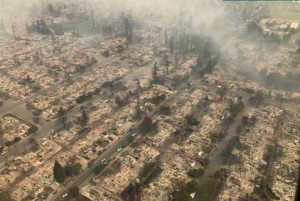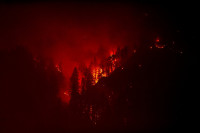

Five weeks ago a massive fire roared through the western half of the Columbia River Gorge, while hundreds of thousands of acres burned across the rest of Oregon, and more than another million in Montana. This week massive wildfires erupted across far more populated areas in Northern California, causing record-breaking damage and loss of life. Why has this year's fire season in the West been so intense? Is this a precursor of what is becoming the new normal?
On this episode of Locus Focus we talk again with Dominick DellaSala, president and chief scientist at the Geos Institute in Ashland, Oregon. In our past conversations with Dominick, we have stressed the important role that fire plays in ensuring healthy forest ecosystems. But after this summer of fire, smoke and ash across the Pacific Northwest, and now Northern California, how do we reconcile our understanding of the need for forests to burn from time to time, with the horrific realities now in our faces.
Dominick DellaSala is an internationally renowned author of over 200 technical papers on forest and fire ecology, conservation biology, endangered species management, and landscape ecology. Dominick has given plenary and keynote talks ranging from academic conferences to the United Nations Earth Summit. He has appeared in National Geographic, Science Digest, Science Magazine, Scientific American, Time Magazine, Audubon Magazine, National Wildlife Magazine, High Country News, Terrain Magazine, NY Times, LA Times, USA Today, Jim Lehrer News Hour, CNN, MSNBC, “Living on Earth (NPR),” several PBS documentaries and even Fox News! His books include Temperate and Boreal Rainforests of the World: Ecology and Conservation andThe Ecological Importance of Mixed-Severity Fires: Nature’s Phoenix. Dominick co-founded the Geos Institute in July 2006 and he currently maintains a provocative conservation science blog and wildfire blog. He is motivated by his work to leave a living planet for his daughter and all those that follow.
- KBOO


